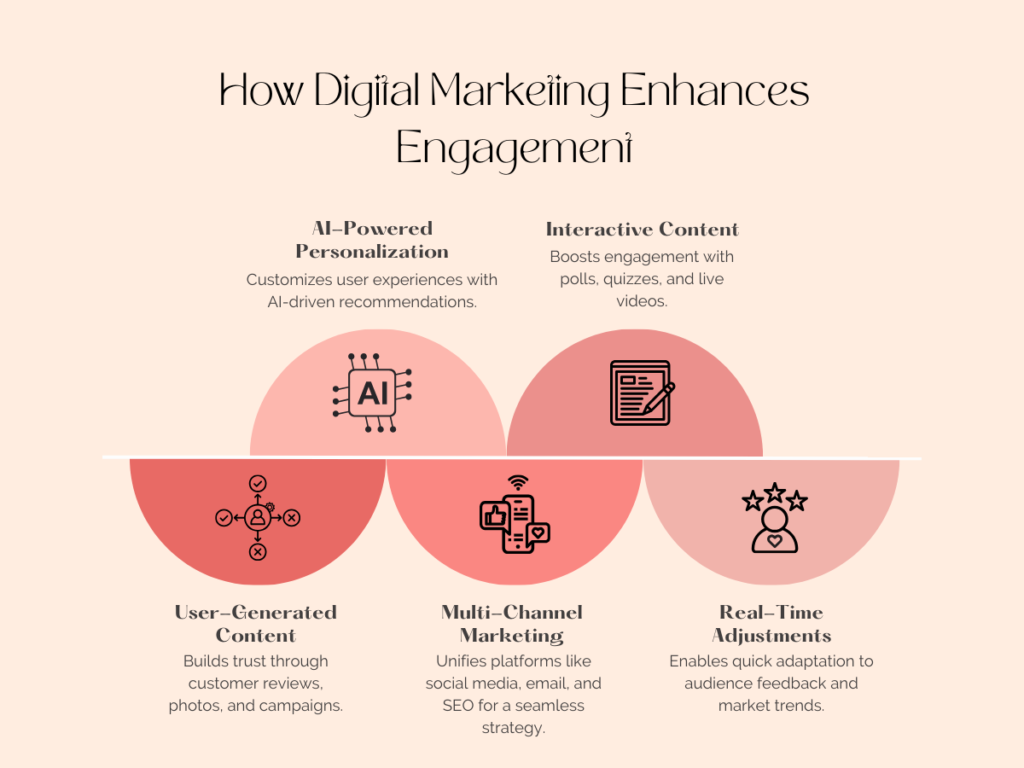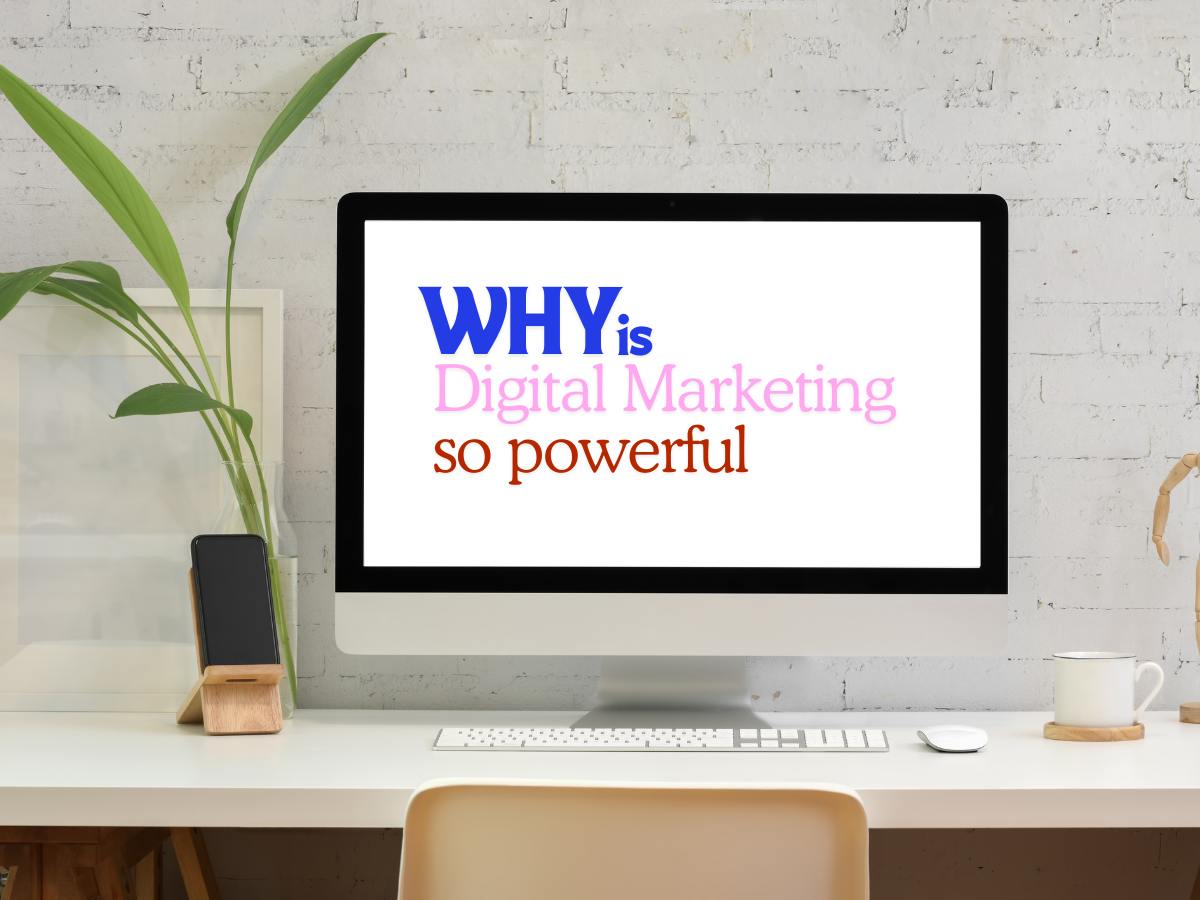Digital marketing has revolutionized the way businesses communicate with their audience, offering unmatched advantages over traditional methods. So, what makes digital marketing so strong? Its strength lies in connecting to targeted audiences, measuring outcomes with a high degree of precision, and adapting strategies in an instant. Using tools such as search engine optimization, social media, email marketing, and data analytics, businesses can reach a global audience with a personal touch.
This flexibility allows companies of all sizes to compete, tailoring campaigns to the needs and preferences of their customers. Real-time tracking of data allows for an understanding of what works, thereby enabling the refinement of strategies for the greatest impact. Furthermore, cost efficiency allows small businesses to compete digitally with their larger counterparts.
Interactive and engaging formats like videos, infographics, and user-generated content enhance customer relationships, foster loyalty, and build trust. It can run a campaign across multiple channels simultaneously, thereby ensuring consistent visibility and brand recognition through digital marketing. Digital marketing is the force that helps business to grow, innovate, and thrive in an ever-evolving digital world. Regardless of the target being the local or global market, adaptability and efficiency with this are essential to achieving sustainable growth.
Key Reasons Why Digital Marketing is So Powerful
Digital marketing has changed how the business world connects to a target audience, using innovative strategy and tools to deliver impactful outcomes. Here are the fundamental reasons why digital marketing is incredibly powerful:
1. Unparalleled Reach
This tool bridges businesses with global markets.
- 24/7 Accessibility:Websites and media sites are open and in use 24 hours/7 days a week.
- Extensive Platform Reach:Platforms like Google Ads and Facebook will allow brands to reach millions of users daily, independent of their location.
- Empower Small Businesses:Unlike conventional advertising, small businesses may compete with global brands easily through cost-effective, focused campaigns targeting specific demographics.
2. Cost-Effective Strategies
Digital marketing is highly accessible, budget-friendly, and result-oriented.
- Pay-Per-Click Efficiency:PPC campaigns ensure that businesses pay only for results, meaning every dollar spent is effective.
- SEO for Longevity:Organic SEO techniques lead to sustainable traffic without having to spend anything on it.
- Affordable Engagement:Social media and email marketing are the most cost-effective ways to connect with customers directly.
3. Data-Driven Insights
The biggest strengths of digital marketing lie in the reliance on data analytics.
- Behavioral Insights:Google Analytics, for example, offers tremendous insight into user behavior and preferences and engagement patterns.
- Campaign Refinement:A/B testing allows businesses to test slight variations in messaging and visuals so that they can optimize for greater results.
- Real-Time Adjustments:Metrics are instantaneously available, which means marketers can modify campaigns and capitalize on opportunities at a faster pace.
How Digital Marketing Enhances Engagement
Engagement with audiences is the core of digital marketing. Advanced tools and strategies help businesses connect meaningfully with their target audience. Here’s how digital marketing boosts engagement:

Personalization and Targeting
Digital marketing really does well in giving experiences which are personalized to each customer’s preference.
- AI-Powered Personalization:Such tools include artificial intelligence and machine learning, which compose customized messages according to the demographics, interests, and behaviors of the users. For example, an e-commerce platform may suggest products that a user has been browsing.
- Retargeting Campaigns:Retargeting is the strategy in which businesses try to re-engage the users who have visited the website but have not converted. For example, ads for items left in a cart ensure that potential customers stay in the loop.
- Email Marketing:With email marketing, companies are able to create direct long-term relationships with their clients. Techniques such as segmentation and tailored messaging ensure the relevance and timeliness of an email to increase open and click-through rates.
Interactive Content
Interactive content is one of the major engagement drivers, where the user gets dynamic, interactive experiences.
- Polls and Quizzes:Social media channels also use polls and quizzes as tools to increase user interaction. They ask audiences to provide their opinions or test knowledge to make campaigns more interesting.
- Live Videos:Platforms such as Instagram and Facebook offer live streaming which will enable businesses to directly engage with their audience. Whether it is Q and A, product launch, etc. Live videos give the same old authentic connection that every business craves.
- Educational Content:Blogs, infographics, and webinars impart knowledge to the audience by educating them. Businesses can show off as industry leaders by delivering actionable insights and solutions towards solving their audience’s issues.
- User-Generated Content (UGC):Encourage customers to post their experiences with a brand (using reviews, photos, or testimonies). This creates a sense of community and loyalty. More advanced forms of UGC are campaign-specific activities, including hashtags contests.
Flexibility and Adaptability
In the ever-evolving digital landscape, a flexible and adaptable business can win the competitive game. Tools and strategies for digital marketing include real-time adjustments and integration from multiple platforms.
Multi-Channel Marketing
Multi-channel marketing ensures that various business digital platforms are merged and can give a more uniform and effective strategy to all the people.
- Social Media Diversification:The various social media networks attract different audiences. LinkedIn is suited for B2B connections, while Instagram does great for the younger audience and is more visual in nature.
- SEO and PPC Synergy:Organic search engine optimization leads to sustainable organic traffic, but PPC campaigns result in quick payoffs. When put together, it presents a well-rounded way to draw attention from your target audience.
- Email Marketing Integration:Emailing is still the best strategy for lead nurturing. Integrated with social media and search marketing campaigns, it helps lead the would-be customer through the purchase decision-making process.
Real-Time Adjustments
Digital marketing makes it possible to respond at the speed of change in performance, audience behavior, and market trend.
- Budget Optimization:Google Ads and Facebook Ads allow for immediate metrics, meaning businesses can allocate their budget to successful campaigns.
- Social Media Flexibility:The campaign can be adjusted based on audience feedback or an unexpected event. This keeps a campaign relevant and builds trust with the target market.
- Competitor Analysis:Through the use of SEMrush and SimilarWeb, one monitors how competitors strategize. Monitoring performance can shift one’s business’s emphasis to filling market gaps or winning strategies.
Benefits of Digital Marketing
Digital marketing has revolutionized how businesses connect with their audience, offering unique benefits that drive growth and efficiency.
Measurable Results
One of the major benefits of using digital marketing is that it helps track metrics in detail. Important KPIs are CTR, ROI, and bounce rate, which help businesses measure and measure campaign success. This results in data-driven strategies that are better optimized for improved results with time.
Global and Local Reach
Digital marketing presents the greatest versatility of any medium by allowing businesses to reach worldwide audiences or to concentrate efforts on local markets. Utilizing geotargeting and localized SEO allows business owners to personalize campaigns based on specific demographics to strike maximum impact.
Scalability
The campaigns can be scaled easily, so they suit all businesses. The startups can start with low budgets and gradually increase it as the operation scales up. In this way, a consistent return on investment is maintained regardless of the size of the campaign.
24/7 Presence
Unlike traditional advertising, digital marketing allows businesses to stay before the customer’s eyes constantly. Websites, social media, and email campaigns work continuously, engaging a customer even when the business hour is not in place.
FAQs
What makes digital marketing powerful for small businesses?
Digital marketing offers affordable and scalable strategies, allowing small businesses to compete with larger brands.
Which digital marketing strategy has the highest ROI?
SEO and email marketing often deliver the highest ROI due to their cost-effectiveness and longevity.
How does digital marketing improve customer engagement?
Digital marketing personalizes interactions through AI and uses interactive content like videos and polls to enhance engagement.
Can digital marketing work for all industries?
Yes, strategies can be tailored to suit any industry, from e-commerce to healthcare and education.
Why is data important in digital marketing?
Data allows businesses to track performance, refine campaigns, and better understand their audience.
How does digital marketing compare to traditional marketing?
Digital marketing offers real-time insights, broader reach, and more cost-efficient strategies than traditional marketing.
What is retargeting in digital marketing?
Retargeting involves re-engaging users who’ve previously interacted with a website or ad but didn’t convert.
How does AI enhance digital marketing?
AI personalizes campaigns, predicts user behavior, and automates tasks like content creation and customer service.
What are the top tools for digital marketing?
Popular tools include Google Analytics, SEMrush, HubSpot, and social media platforms like Facebook Ads Manager.
How do I start a digital marketing campaign?
Begin by defining your target audience, setting clear goals, and selecting the right platforms and tools.


Comments are closed